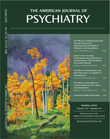The Role of a Prescription in Anxiety Medication Use, Abuse, and Dependence
Abstract
Objective:
Prescriptions for anxiety medications have increased substantially in recent years. Individuals with anxiety disorders are at risk of nonmedical use of these medications, but information about whether this risk is elevated among patients with a prescription for such medications is lacking. The authors compared risk of nonmedical use in individuals in a national sample with and without a prescription for anxiety medication and identified characteristics associated with nonmedical use.
Method:
Data were drawn from face-to-face surveys of 34,653 adult participants in the National Epidemiologic Survey on Alcohol and Related Conditions. The risk of nonmedical use of prescription anxiety medication and associated drug use disorders was computed for individuals who had or had not ever received a prescription for anxiety medication; among those who had received a prescription, characteristics associated with nonmedical use were analyzed.
Results:
Prescription of anxiety medication was associated with lifetime and past-year nonmedical use (odds ratios, 1.6 and 1.9, respectively) and lifetime DSM-IV abuse or dependence (odds ratio, 2.6). Among respondents who received a prescription (N=4,294), nonmedical use was associated with male sex, younger age, white race, history of use of illicit drugs, history of other drug use disorders, and history of illegal behaviors.
Conclusions:
These results indicate that prescription for anxiety medications is associated with nonmedical use of these medications, although the direction of causality cannot be determined in this study. Although anxiety medications have clinical utility, greater clinical attention should be given to the potential for their abuse among patients at particular risk.



